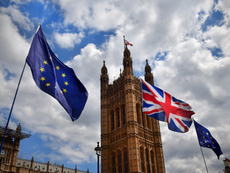The UK is out of fashion for investors – but sentiment could be about to turn
The UK’s service-oriented economy has been particularly hard hit by lockdowns but, as we saw last summer, it bounces back fast when the brakes come off, writes Hamish McRae


Big money did not like Brexit. Global investors have shunned the UK since the referendum, cutting the share of UK assets in their portfolios, and driving down the sterling exchange rate. On 23 June 2016, the day when the British public voted to leave the EU, sterling was valued at $1.49. It has not been anywhere near that since, spending most of the intervening period in the $1.20 to $1.30 range. Even as the trade deal was announced on Christmas Eve, it stood at only about $1.35.
So the question now is how quickly confidence will return, not just in sterling but in UK assets more generally. Or, for the pessimists, will it return at all?
It is a complex question because the settlement with Europe is only one of several factors in the equation. The pace of recovery from the Covid crisis is more important and, in terms of share prices, so is the attitude of investors towards what are called “value stocks”: the banks, pharmaceuticals, the big energy and resources companies, the supermarkets, and so on. The FTSE 100 index is overweight in these basic enterprises, while it has very few hi-tech companies – the so-called “growth stocks” – basically because nearly all of them are American.
So how to unpick it? The first thing to do is to get the exchange rate out of the way. Here it is pretty clear that the pound is likely to rise against the dollar, partly because the dollar itself is widely reckoned to be overvalued. We could see the pound back in the $1.40s but still languishing against the euro. My guess is that it will rise against both currencies and it is quite likely that it will be back to pre-referendum levels by the end of the year.
That does depend on something else happening, however: a swift bounce-back in the economy. Here views differ. The conventional view is that the UK will make a slower recovery than the eurozone and a much slower one than the US. For example, Kallum Pickering, the economist at Berenberg Bank, reckons that the US will be back to pre-Covid output levels by the end of this coming year, Europe by the middle of 2022, and the UK six months after that. The more optimistic view is that if the UK can roll out the vaccines fast enough, it can gain at least three months on Europe, and get back to full output rather sooner.
Of course, no one can know, but the comments by Rishi Sunak, the chancellor, that lockdowns could be over by the end of February are encouraging. The UK’s service-oriented economy has been particularly hard hit by the lockdowns, but as we saw last summer, it bounces back quickly when the brakes come off. There has, nevertheless, been huge damage in every way and once the “brakes-off” bounce is over, the recovery may falter. We will see.
What might all this mean for share prices? Obviously, the earlier and stronger the recovery, the better it will be for any company supplying consumer goods. There has been a huge build-up of household savings. They were 17 per cent of disposable income in the third quarter of this year, whereas they normally run between five per cent and 10 per cent. Spending some of that money brings direct profits to the companies supplying the stuff, with the hospitality industry in the front line. Other things being equal, this should benefit UK enterprises that focus on the home market. There have been suggestions that this urge to spend will lead to a “Roaring Twenties”.
We don’t know. What we do know is that, in anticipation of the Brexit deal, there was a modest recovery in the FTSE 100 share index but a greater one for the FTSE 250. The former reflects the prospects for the largest and most internationally oriented companies, the latter for medium-sized enterprises that focus more on the domestic market. However, both markets, unlike their US counterparts, are still below their February, pre-Covid peaks; that is a measure of the UK being so out of fashion.
My guess is that investors will take several months to reassess the UK. Confidence will not return swiftly, for it never does. But if the UK manages a swifter recovery than continental Europe, thanks to the swifter roll-out of vaccines, that will be a game-changer for the economy and will, in turn, start to shift sentiment. If there is also a shift from hi-tech stocks to value ones, that will further move some money into UK shares.
The beneficiaries of all this would be British investors. Directly, it would help the 11 million people with an ISA; slightly less directly, it would help a similar number of people saving through private pensions. So a return of confidence in the UK economy is not simply about a better exchange rate for a foreign holiday. It is about much bigger numbers for the nation’s savers. But do not expect any sudden surge in the pound this week, or trust such a surge if it should happen. This will be a long slog back for the markets, just as it will be a long slog for the rest of us in our daily lives.




Join our commenting forum
Join thought-provoking conversations, follow other Independent readers and see their replies
Comments